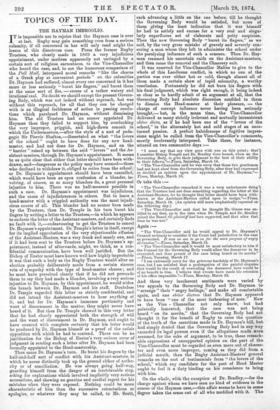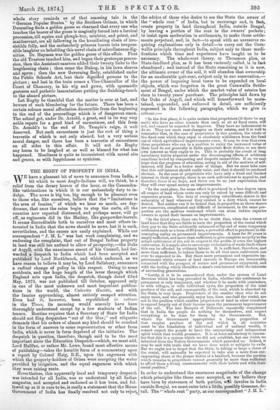TOPICS OF THE DAY.
THE HAYMAN IMBROGLIO.
IT is impossible not to rejoice that the Hayman case is over at last. Rugby may gain something even from a serious calamity, if all concerned in her will only read aright the lesson of this disastrous case. From the former Rugby Trustees, who clearly made in 1869 a very injudicious appointment, under motives apparently not untinged by a certain sort of religious earnestness, to the Vice-Chancellor who heard the case, and, to use the humorous comparison of the Pall Mall, interposed moral remarks "like the chorus
of a Greek play at convenient periods" on the calamities Dr. Hayman had suffered, almost every one concerned in it has more or less seriously " burnt his fingers," and burnt them at the same sort of fire, — excess of a rather watery and irrational zeal. No doubt we should except the present Govern- ing Body, which was not indeed without reproach, but was without this reproach, for all that they can be charged with is an illogical feebleness of action in passing resolu- tions which paralysed Dr. Hayman, without dismissing him. The old Trustees had no sooner appointed Dr. Hayman than they failed to support him, by overlooking the very improper, priggish, and high-flown conceit in which the Undermasters,—after the style of a sort of peda- gogic Sir Piercie Shafton,—dissertated on what "the lovers of the school" ought to have done for any new head- master, and had not done for Dr. Hayman, and on the barrier" raised up between the said " lovers " and the As-
sistant-masters, through Dr. Hayman's appointment It seems to us quite clear that either that letter should have been with- drawn, and—dangerous as the policy may have seemed—those who declined to withdraw it, obliged to retire from the school; or Dr. Hayman's appointment should have been cancelled, which would have been an open confession of a blunder, in- volving, of course, as so many blunders do, a great personal injustice to him. There was no half-measure possible in such a case. Dr. Hayman's appointment was injudicious, and the cause of injudiciousness in others. But to leave a head-master with a crippled authority was the most injudi- cious course of all. This blunder had no sooner been made by the Trustees, than Dr. Temple in his turn burnt his fingers by writing a letter to the Trustees,—in which he appears to endorse the letter of the Assistant-masters, and certainly finds no fault with it,—endeavouring to get the Trustees to cancel Dr. Hayman's appointment. Dr. Temple's letter in itself, except for its implied approbation of the very objectionable effusion of the Assistant-Masters, was a very frank and manly one, and if it had been sent to the Trustees before Dr. Hayman's ap- pointment, instead of afterwards, might, we think, as a con- fidential communication, have been well justified. But the Bishop of Exeter must have known well how highly improbable it was that such a body as the Rugby Trustees would alter an election probably deliberately made from a certain sincere vein of sympathy with the type of head-master chosen ; and he must have perceived clearly that if he did not persuade them to say they had made a blunder, involving a very serious injustice to Dr. Hayman, by this appointment, he would widen the breach between Dr. Hayman and his staff. Doubtless Dr. Temple regarded this letter as strictly confidential, and did not intend the Assistant-masters to hear anything of it, and but for Dr. Hayman's immense pertinacity and want of discernment in the matter, they might never have heard of it. But then Dr. Temple showed in this very letter that he had clearly appreciated both the strength of will and the want of discernment in Dr. Hayman, and ought to have counted with complete certainty that his letter would be produced by Dr. Hayman himself as a proof of the unfair opposition with which he had to contend. There can be no justification for the Bishop of Exeter's very serious error of judgment in sending such a letter after Dr. Hayman had been formally appointed to the Head-mastership.
Then came Dr. Hayman's turn. He burnt his fingers by the half-and-half sort of conflict with his Assistant-masters, in which he never distinctly took up the ground either of autho- rity or of conciliation. He was always going half-way, guarding himself from the danger of an irretrievable step, asking for explanations which involved implicitly very serious accusations, and showing no genuine and cordial regret for his mistakes when they were exposed. Nothing could be more characteristic of him than the successive retractations or apologies, or whatever they may be called, to Mr. Scott, each advancing a little on the one before, till he thought the Governing Body would be satisfied, but none of them giving the least indication that it was himself he had to satisfy and excuse for a very real and singu- larly superfluous act of elaborate and petty suspicion. Then the new Governing Body "burnt its fingers," as we said, by the very gross mistake of gravely and severely cen- suring a man whom they left to administer the school under the paralysing influence of such a censure. Then Dr. Hay- man resumed his uncertain raids on the Assistant-masters-, and then came the removal and the Chancery suit. It was reserved for Vice-Chancellor Malins to give to the- whole of this Laodicean conflict, in which no one of the parties was ever either hot or cold, though almost all of them made a certain show of tepid solemnity, a worthy conclusion. Fortunately he did not burn his fingers with. his final judgment, which was right enough, it being indeed so clear as to hardly admit of an argument at all, that the Governing Body had absolute discretion confided to them to dismiss the Head-master at their pleasure, — the charge of corrupt influence never having been seriously
brought,— but, in the mean time, the Vice-Chancellor delivered as many strictly irelevant and mutually inconsistent °biter dicta, as if he had been one of the "lovers of the. school," in the alternately hot and cold stages of an unre- turned passion. A perfect kaleidoscope of fugitive impres-
sions might be culled from the Vice-Chancellor's comments, mostly irrelevantly interposed. Take these, for instance, uttered on two consecutive days :—
"1 must say that my view goes with you on this point ; that I consider Bishop Temple and Dr. Bradley were bound, when en the L Governing Body, to give their judgment to the best of their ability I to their fellows."—Times, Saturday, March 14.
"The Vice-Chancellor said he was sorry that those two gentlemen had not kept aloof from the Governing Body, after they had expressed I so decided an opinion upon the appointment of Dr. Hayman."— ITimes, Monday, March 16.j
Or take this :—
"The Vice-Chancellor remarked it was a very unfortunate thingl that the Trustees had not done something regarding the letter of the Assistant-Masters, for he thought that letter should have been with- drawn or the Assistant-Masters called upon to resign."—Times, Saturday. March 14. (An opinion still more emphatically repeated on the following day.) "The Vice-Chancellor said that he thought Mr. Glasse was en- titled to say that, up to the time when Dr. Temple and Dr. Bradley joined the Board the plainti e' had been supported, and that after that time he was not."
Again :—
" The Vice-Chancellor said he would appeal to Dr. Hayman's Counsel seriously to consider if the Court had jurisdiction in the case as presented. It was no use to go on for the mere purpose of angry dheussion."—Times, Saturday, March 14.
The Vice-Chancellor said it would be most satisfactory to him if the Counsel for the Governing Body would allow the demurrer to be overruled, and thus permit of the case being heard on its merits." —Times, Tuesday, March 17.
"I am extremely sorry for the grievous hardship of Dr. Hayman's case, but I am satisfied that a prolongation of the painful disputes that would be the result of overruling the demurrer here would be of no benefit to him. I believe that events have made his retention of his office impossible."—Times, Monday, March 23.
And these very incoherent sentiments were varied by two appeals to the Governing Body and Dr. Hayman to " arrange " their "angry feelings," and make all comfortable again, and one alter dictzaa that Dr. Hayman appeared to have been "one of the most forbearing of men." Now as the Vice - Chancellor not only knew, but had pointedly lamented, that the case was not being- heard "on its merits," that the Governing Body had not thought it for the benefit of Rugby to raise the question of the truth of the assertions made in Dr. Hayman's bill, but had simply denied that the Governing Body had in any way exceeded its legal powers even if the allegations made were assumed, for the sake of argument., to be true, these reraark- able expressions of unsupported opinion on the part of the. Vice-Chancellor must be regarded as even more out of charac- ter and even more improper, coming as they did from a judicial mouth, than the Rugby Assistant-Masters' general
remarks on the sort of testimonials from " the lovers of the school," which any candidate for the post of Head Master ought to feel it a duty binding on his conscience to bring with him.
On the whole, with the exception of Dr. Bradley,—for the
charge against whom we have seen no kind of evidence in the course of the Hayman case,—this affair seems to have in some degree taken the sense out of all who meddled with it. The whole story reminds us of that amusing tale in the "German Popular Stories" by the Brothers Grimm, in which Dammling finds a golden goose so charmed that every one who touches the bearer of the goose is magically forced into a farcical procession, till squire and plough-boy, minister, and priest, and maidservant, are all following in the humiliating chain of irre- sistible folly, and the melancholy princess bursts into irrepres- sible laughter on beholding this novel chain of miscellaneous dig- nities. Dr. Hayman was the golden goose of this affair. First the old Trustees touched him, and began their grotesque proces- sion, then the Assistant-masters added their twenty links to the lengthening chain ; then came the Bishop, in his lawn sleeves and apron ; then the new Governing Body, established under the Public Schools Act, lent their dignified persons to the picture ; and last in the train comes a Vice-Chancellor of the Court of Chancery, in his wig and gown, with spasmodic gestures and pathetic lamentations putting the finishing-touch to the absurd picture. Let Rugby be thankful that the matter is over at last, and beware of such blundering for the future. There has been a certain solemn moral affectation discernible from the beginning to the end of the proceedings which is of dangerous omen. The school got, under Dr. Arnold, a great, and in its way very noble repute for a good kind of earnestness, and this from Dr. Arnold's to the end of Dr. Temple's reign, it well deserved. But such earnestness is just the sort of thing a travestie of which is not only absurd, but a very serious moral danger, and there has been a travestie of earnestness on all sides in this affair. It will not do Rugby any harm to be laughed at as well as blamed for what has happened. Manliness is quite Ls inconsistent with moral airs and graces, as with foppishness or cynicism.



































 Previous page
Previous page